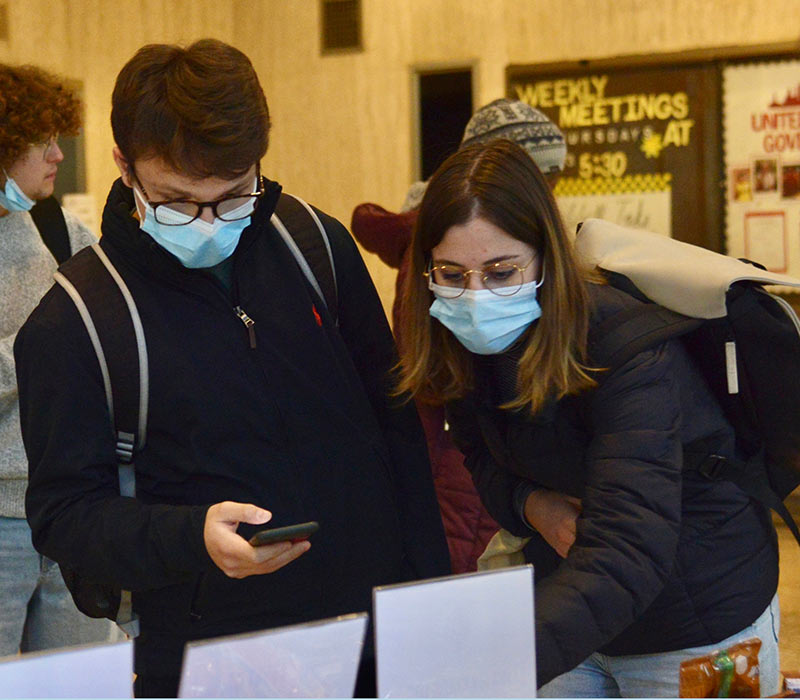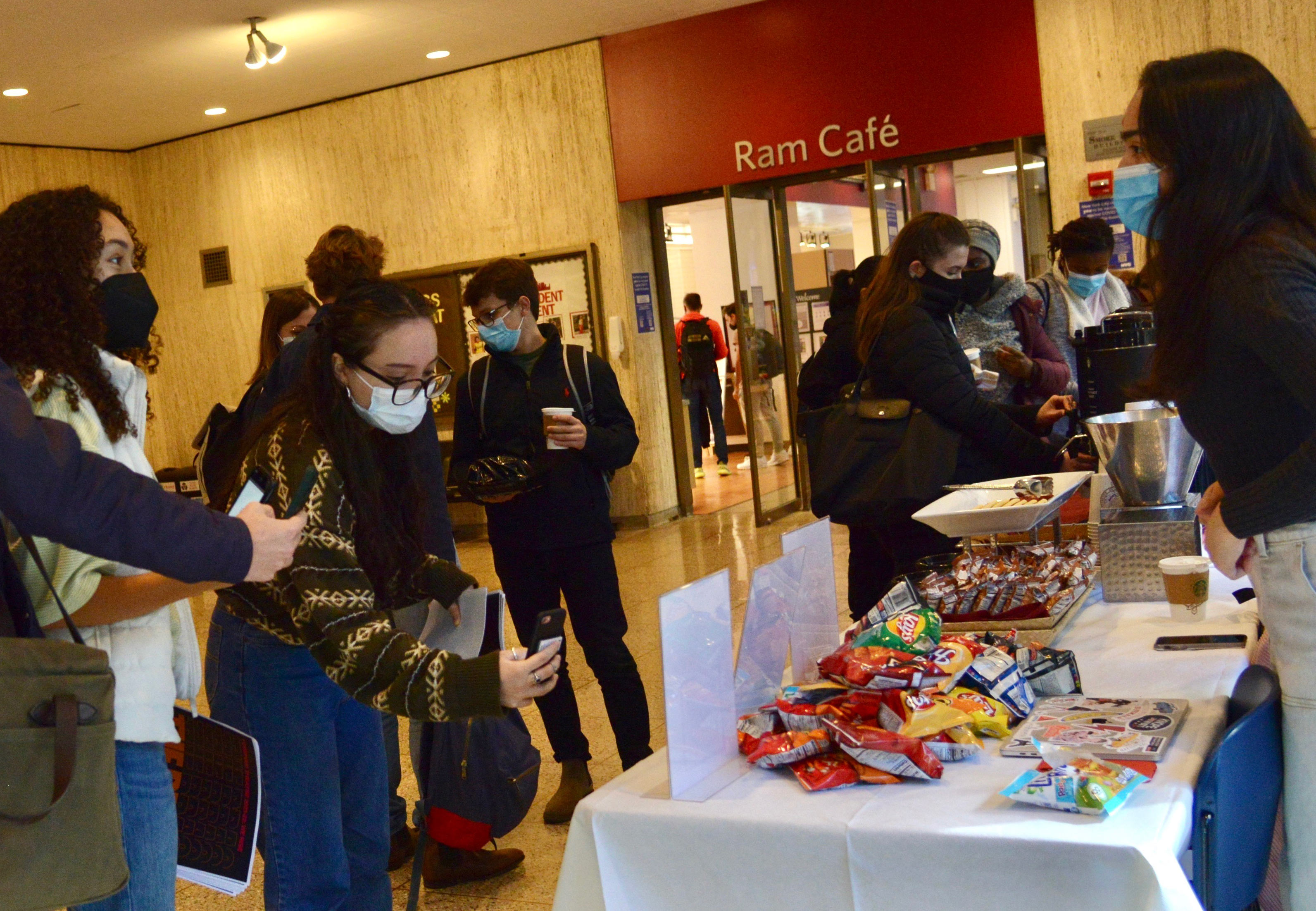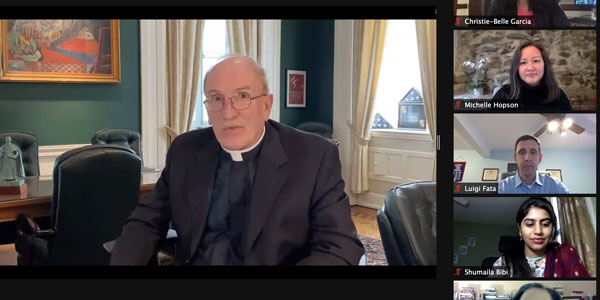The First Gen Network debuted in the fall, founded by students after Fordham administrators held listening sessions last year about first-generation students’ experiences. It’s proving a valuable connection point for students who may arrive at the University less familiar with college life—and college opportunities—because of their family backgrounds.
Jin Lin Chen, a senior in the Gabelli School of Business and one of the founding student members, said she’s excited about the First Gen Network because of the importance of outreach to different social groups at the University to foster diversity and inclusion. “I’m glad I’m leaving the school knowing that this network exists,” she said.
The group held sign-up events at the Lincoln Center and Rose Hill campuses on Nov. 8, celebrated as National First Generation Day since 2017. It happened to be the same day that the University launched a fundraising campaign, Cura Personalis | For Every Fordham Student, that seeks—among other things—to honor Fordham’s heritage of welcoming first-generation students by ensuring that the University is accessible to them and to students of other diverse backgrounds.

The network has generated strong interest; Alexa Stegmuller, a second-year Fordham College at Lincoln Center student and another founding member, estimated that more than 200 people have joined its email list. For its next event, the group is hosting a spring mixer on March 25 at the new campus center at Rose Hill.
The group welcomes all students, not only those who are first-generation, as well as administrators and faculty. On Nov. 29, the First Gen Network and the Diversity Action Coalition held a panel discussion that included professors who were first-generation students themselves.
Nicole Varela, a first-year Fordham College at Lincoln Center student, joined the group at its Nov. 8 event. Her parents both attended college in El Salvador but never finished. She benefited from having seen her older brother apply to college—after he was able to find help from people who knew the process.
“SATs, ACTs, college essays—I feel like people who know a lot more about that have an advantage,” she said.
Stegmuller noted that many first-generation students have to overcome the inclination to do everything themselves, since that’s what they’re used to.
Asking for Help
Seeing a professor during office hours, asking a dean for help, checking in with a counselor—these things can feel weird for first-generation students, she said. She recalled a professor handing out a syllabus in one of her classes and seeing that it had a listing of student support services—three pages’ worth.

“I didn’t expect that of a college coming in, just because I didn’t really have an idea of what college was until I got here,” she said. “There are so many people here wanting to help.”
In high school, her friends tended to know the college application process “inside and out, basically,” because their parents or siblings had gone to college, she said.
“It’s daunting to like be like, ‘I think I need to ask for help,’ or ‘I’m really not sure, I don’t know what a FAFSA is,’ that sort of thing,” she said, referring to the Free Application for Federal Student Aid.
The application process was hard for her and her parents—“they didn’t really go through that experience,” she said. “It was a learning experience for all three of us.”
The Impact of Giving
She and Jin Lin Chen said scholarships and financial aid made all the difference in helping them enroll at Fordham. Stegmuller received a Jogues Scholarship and a need-based grant from the University. Jin Lin Chen received a federal Pell Grant in addition to a few different scholarships from Fordham. In addition to helping her pursue her dreams and take advantage of opportunities like studying abroad, “it was a way that I could somehow give back to my parents,” she said.
The aid “helped solidify a lot of the things that they wish for me and … things that I wish for myself,” she said.
Scholarships and financial aid are one priority of the Cura Personalis campaign. Campaign gifts could make a difference for first-generation students in any number of other ways, said Christie-Belle Garcia, assistant dean for student support and success at Fordham College at Rose Hill.
They could provide funding for travel to conferences, for instance, or stipends for unpaid internships, or the creation of a summer bridge program that helps incoming first-generation students familiarize themselves with Fordham and the college experience, she said.
Garcia helped launch the First Gen Network along with Tracyann Williams and Marisa Villani, her counterparts at Fordham College at Lincoln Center and the Gabelli School of Business, respectively.
“It started organically, because we were hearing from students that there was a need,” Villani said. They held a few listening tours via Zoom, and then students took the lead in launching the group.
“We work with them closely, and at the same time we want to make sure that the ideas are coming from them,” Williams said. “Because they are amazing.”
Patrick Verel contributed reporting.
The First Gen Network welcomes members of the Fordham community who are first-generation students as well as those who wish to support them. See here for more information about the group or send an email to [email protected].
To inquire about giving in support of first-generation students or to meet other needs at the University, please contact Michael Boyd, senior associate vice president for development and university relations, at 212-636-6525 or [email protected]. Learn more about Cura Personalis | For Every Fordham Student, a campaign to reinvest in every aspect of the Fordham student experience.
]]>Those are just a few of the reasons why the Diversity Action Coalition at Rose Hill, part of United Student Government (USG), along with United Student Government at Lincoln Center and the deans’ offices at Fordham College of Rose Hill, Fordham College of Lincoln Center, and the Gabelli School of Business, organized a virtual First-Generation Celebration, held virtually on May 4.
Lifting Up All Voices
“Being part of USG means not only listening to our voices, but also celebrating and uplifting certain voices,” said Loreen Ruiz, a senior at Fordham College Lincoln Center and president of USG. “To my knowledge, this is the first time that there has been any kind of celebration that recognizes first-generation students specifically.”
More than 40 members of the Class of 2021 submitted photos and mini-bios that were featured at the event in a slideshow.
Camilla Gomez, a junior at Fordham College Rose Hill and co-chair of the Diversity Action Coalition, who helped organize the event, said that as a first-generation student herself, seeing the graduates was inspiring.
‘You Are All Agents of Change’
“You all are agents of change and justice for your own families, making generational changes, and growing that generational wealth, and that’s incredibly inspiring to see in all of you and I feel honored to be in your presence,” she said.
Joseph M. McShane, S.J., president of Fordham, said that the first-generation students hold a special place in the University’s heart and history, as well as for him personally, as his father was a first-generation college student.

“I look at you, I see my own father,” he said. “Like many of you, he was the first member of his family to go to college. Therefore, like many of you, he knew the awful and awesome responsibility that lay on his shoulders, for his entire family pinned their hopes on him. Through his achievements, they saw their own dreams come true.”
First-Gen Alumni Offer Support
The event featured three alumni speakers, all of whom were first-generation students, as well as games and prizes for participants.
Joy Tolliver, a 2004 graduate of Fordham College Rose Hill who majored in psychology and went on to get her J.D. at Rutgers University, told the students that the fact that they were able to make it through college, particularly during the COVID-19 pandemic, shows their resiliency.
“It really speaks volumes as to who you are—your resiliency, your persistence, and your determination to make it despite the odds against you,” she said. “I know the title of the event tonight is your experience as a first-gen student, but you’re more than that—you are trailblazers for your families and your communities.”
Luigi Fata, a 1991 graduate of the Gabelli School of Business, encouraged the students to use their stories and experiences to find their own “unique selling proposition.”
“Your experience as the first has to be what carries you and gives you that fuel, and that fire, energy, and passion to do what it is you want to do, because the others who don’t have that first-gen mindset are going to be up against expecting to get what they want,” he said. “We need to work harder for it to go after what we want.”
Michelle Hopson, a 2009 graduate from PCS, told the students to use their experiences to shape their future goals.
“Remember who your identities are and all the people who have come and worked hard for you and you’ve worked hard for them,” she said. “Don’t forget who you are, where you came from, and use that as an identity builder, not an identifier.”
She also encouraged the students to use the alumni network that Fordham offers to find mentors and support even after graduation so they don’t feel alone.
“If you ever need a mentor, just reach out and let us know—we’re here for you guys,” she said. “We’ll help and share what it takes to be successful.”
]]>